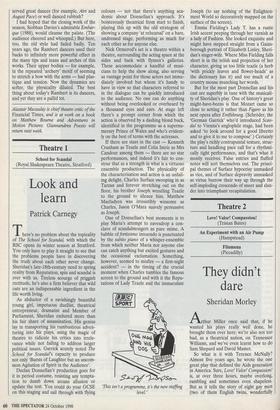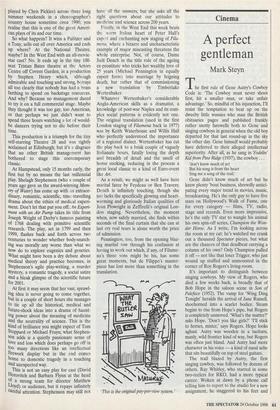Theatre 2
Love! Valor! Compassion! (Tristan Bates) An Experiment with an Air Pump (Hampstead) Filumena (Piccadilly)
They didn't dare
Sheridan Morley
Arthur Miller once said that, if he wanted his plays really well done, he brought them over here; we're also not too bad, as a theatrical nation, on Tennessee Williams, and we've even learnt how to do Sam Shepard and David Mamet.
So what is it with Terence McNally? Almost five years ago, he wrote the one great play that defined the Aids generation in America. Sure, Love! Valor! Compassion! is, at over three hours, maybe overlong, rambling and sometimes even shapeless. But as it tells the story of eight gay men (two of them English twins, wonderfully played by Chris Pickles) across three long summer weekends in a choreographer's country house sometime circa 1990, you realise that this is one of the great Ameri- can plays of its and our time.
So what happens? It wins a Pulitzer and a Tony, sells out all over America and ends up where? At the National Theatre, maybe? In the West End with an all-movie- star cast? No. It ends up in the tiny 100- seat Tristan Bates theatre at the Actors Centre off Covent Garden, in a production by Stephen Henry which, although admirable and touching and strong, betrays all too clearly that nobody has had a brass farthing to spend on backstage resources. And why? Because no management dared to try it on a full commercial stage. Maybe they thought it was too gay, too American, or that perhaps we just didn't want to Spend three hours watching a lot of would- be dancers trying not to die before their time.
This production is a triumph for the tiny self-starring Theatre 28 and was rightly acclaimed at Edinburgh; but it's a disgrace that no other British management has bothered to stage this contemporary classic.
At Hampstead, only 15 months early, the first but by no means the last millennial Play. Shelagh Stephenson (who a couple of years ago gave us the award-winning Mem- o?), of Water) has come up with an extraor- dinary, romantic, scientific, time-travelling drama about the ethics of medical experi- ment. Don't let that put you off; An Experi- ment with an Air Pump takes its title from Joseph Wright of Derby's famous painting of 1768 dealing with primitive scientific research. The play, set in 1799 and then 1999, flashes back and forth across two centuries to wonder whether body-snatch- ing was morally any worse than what we now do to explore eugenics and genetics. What might have been a dry debate about medical theory and practice becomes, in Stephenson's agile play-writing, a murder mystery, a romantic tragedy, a social satire and a bleak glimpse of the scientific future for 2001.
At first it may seem that her vast, sprawl- ing idea is never going to come together, but in a couple of short hours she manages to tie up all the historical, medical and future-shock ideas into a drama of haunt- ing power about the meaning of medicine and the neutrality of science. This is the kind of brilliance you might expect of Tom Stoppard or Michael Frayn; what Stephen- son adds is a quietly passionate sense of love and loss which does perhaps go off in too many directions like an intellectual firework display but in the end comes home to domestic tragedy in a touching and unexpected way. This is not an easy play for cast (David 1-lorovitch and Barbara Flynn at the head of a strong team for director Matthew Lloyd) or audience, but it repays infinitely careful attention. Stephenson may still not have all the answers, but she asks all the right questions about our attitudes to medicine and science across 200 years.
Finally, in the West End this week beats the warm Italian heart of Peter Hall's expert and enchanting new staging of Filu- mena, where a bizarre and uncharacteristic example of major miscasting threatens the whole enterprise. Not, of course, Dame Judi Dench in the title role of the ageing ex-prostitute who tricks her wealthy love of 25 years (Michael Pennington in equally expert form) into marriage by feigning death, but rather that of commissioning a new translation by Timberlake Wertenbaker.
Whatever Wertenbaker's considerable Anglo-American skills as a dramatist, a knowledge of post-war Naples and its com- plex social patterns is evidently not one. The original translation (used in the first London staging of Filumena back in 1977) was by Keith Waterhouse and Willis Hall who perfectly understood the importance of a regional dialect. Wertenbaker has cut the play back to a brisk couple of vaguely Italianate hours, fatally losing the depth and breadth of detail and the smell of home cooking, reducing in the process a great local classic to a kind of Euro-event like Art.
As a result, we might as well have here marital farce by Feydeau or Ben Travers; Dench is infinitely touching, though she too lacks the specifically glowing and heart- warming and gloriously Italian qualities of Joan Plowright in Zeffirelli's original Lon- don staging. Nevertheless, the moment when, now safely married, she finds within seconds of the final curtain that she can at last cry real tears is alone worth the price of admission.
Pennington, too, from the opening blaz- ing marital row through his confusion at having to work out which, if any, of Filume- na's three sons might be his, has some great moments, but de Filippo's master- piece has lost more than something in the translation.
'This is the original pay-per-view system.'



















































































 Previous page
Previous page